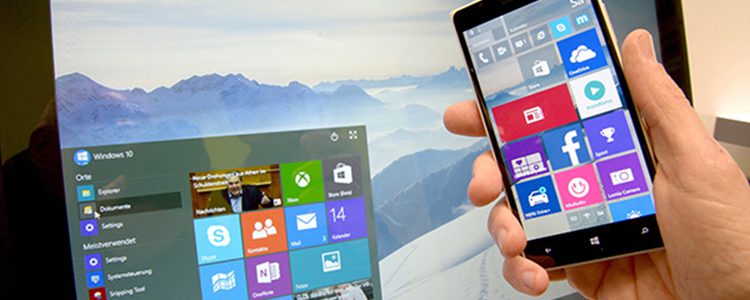In the summer of 2015 there was a huge amount of fanfare surrounding the high profile launch of Microsoft’s Windows 10 operating system. Technology geeks, general consumers and business owners alike were fascinated by just what the new OS had to offer and how the launch was going to go. Once the hullaballoo ended however, the chances are that if you’re a small business owner, you simply went back to using your existing IT setup and gave Windows 10 little further thought.
If that does sound like you, then you are certainly not alone, as migrating a whole set of company PCs and devices to a new operating system is a major undertaking and one that not many firms would consider in the earliest days and weeks of an operating system’s existence. Some nine months on from the original launch however, is now the time to start thinking about making the change?
Business Adoption of Windows 10
Earlier this year Microsoft announced that Windows 10 adoption was outpacing that of Windows 7 and Windows 8 at a comparable point by nearly 140% and nearly 400% respectively, and that adoption has included a significant number of businesses. In the ten weeks after the Windows 10 launch in fact, Microsoft reported that there were a total of eight million business PCs using the new operating system.
More recently, a survey of IT professionals has also revealed that Windows 10 penetration has already reached 11%, making it on course to surpass the 40% expectation for its first year. That business adoption has been accelerated in recent months too, following the first major Windows 10 update late last year. That update had a number of features aimed specifically at businesses and led the head of Microsoft Windows and Devices, Terry Myerson to write in his blog that Microsoft ‘confidently recommend Windows 10 deployment to whole organisations.
Potential Benefits of Switching to Windows 10
There is no doubt that one of Windows 10’s main aims has been to rectify some of the key errors Microsoft made in developing Windows 8. One major example is how the new OS is far less tablet focussed than its predecessor and that is unquestionably a plus when it comes to business use. The return of the start menu and the inclusion of Windows Store apps that behave more like traditional Windows applications are far better for day-to-day desktop use and therefore better suited to business.
Beyond that, Windows 10 too boasts plenty of interesting new features that could make life much easier for any business making the switch. Microsoft’s new Edge browser for instance, is a big upgrade on Internet Explorer, the inclusion of Cortana for desktops could aid organisation and management, and greater control of the deployment of updates is also key for firms on a practical level.
What could arguably be most notable benefits for businesses switching to Windows 10 however, come in the areas of IT management and cyber-security. The new OS has been specifically designed to allow for cross-device deployment and that could be a godsend for any company which needs staff to be able to access systems or work using both mobile and desktop devices. The system too, has plenty of beefed up security to combat the increasing number of cyber-security threats to businesses. These include to name just two, two-factor authentication and a ‘Device Guard’ feature to help combat malware and other malicious software, both of which could mean the difference between a company suffering a catastrophic incursion or continuing with business as usual.
Whilst migrating your company’s PCs to a new operating system is a major undertaking therefore, it might just be one that it is time to tackle. If you need more advice about this or other IT management decisions, Mustard IT’s dedicated professionals are ready, willing and able to assist.




